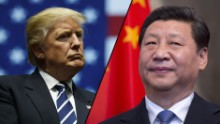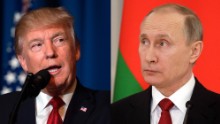begin quote from:
What US sanctions will do to Russia, Iran and North Korea
What US sanctions will do to Russia, Iran and North Korea
(CNN)US President Donald Trump signed into law new sanctions against Russia, Iran and North Korea on Wednesday, but he had little choice in the matter.
Members of Congress supported the legislation in
such overwhelming numbers that they had the power to override the
President if he vetoed the legislation, which he described as "seriously
flawed."
Here's what you need to know:
Russia sanctions
Why now?
Congress
justified a new set of sanctions against Russia -- and the refinement
of existing ones -- because of Moscow's interference in the 2016 US
election, its human rights abuses and its military aggression in
Ukraine, including the annexation of Crimea.
Who's targeted?
The Russian sanctions will target people and entities that:
-- undermine US cybersecurity on behalf of the Russia government
-- invest certain amounts in Russia's energy export pipelines
--
conduct "significant" transactions with Russian defense and
intelligence agencies (though this will come into effect six months from
now)
-- commit, or assist in, serious human rights abuses
-- commit acts of "significant" corruption
-- provide support to the Syrian government to acquire arms
--
invest, or facilitate the investment of, $10 million or more in the
Russian government's privatization of state-owned assets in a 12-month
period that could "unjustly" benefit government officials or their
associates.
What are the sanctions?
The
law includes a list of sanctions, which include freezing assets, such
as property, revoking US visas and banning exports from the United
States to sanctioned people or entities. In certain cases, the President
must impose at least five types of sanctions on a person or entity.
What's the fallout?
For
Russia, the new law limits the US President's power to unilaterally
ease or waive most sanctions without the approval of Congress. This
shift of power is central to Trump's resentment for this law, he
indicated on Wednesday, arguing that the law encroached on the
executive's authority. The President claimed after signing the bill into
law that he could "make far better deals with foreign countries than
Congress."
The White House said in a statement
that the law includes "a number of clearly unconstitutional provisions"
that "purport to displace the President's exclusive constitutional
authority to recognize foreign governments, including their territorial
bounds."
The new law has all but
crushed hopes of the reset in US-Russia relations that both Trump and
Putin had openly called for. Moscow retaliated after the bill passed
Congress, ordering the US to cut staff at its diplomatic mission by 755 people.
Russian
Prime Minister Dmitry Medvedev also said the sanctions showed a
"fully-fledged trade war" had been declared against Russia and that "the
Trump administration demonstrated complete impotence, in the most
humiliating manner, transferring executive powers to Congress."
Iran sanctions
Why now?
US
officials say that Iran has continued to test and develop ballistic
missiles, in what Washington and its European allies say are in
violation of a UN Security Council Resolution. As recently as July, the
US State Department criticized Iran for continuing to develop its ballistic missile program, but did not give details of when or how they did so.
US
officials have also accused Iran of supporting groups that Washington
has designated as terrorist organizations, such as Hezbollah and Hamas,
and violent groups, including the Palestinian Islamic Jihad, arguing the
country is threatening to destabilize the Middle East.
In
mid-July, the Trump administration sanctioned 18 people and entities,
under existing laws, for non-nuclear reasons, such as supporting
ballistic missile development.
The
US State Department at the time accused Iran of propping up the regime
of Syrian President Bashar al-Assad "despite Assad's atrocities against
his own people" and arming Houthi rebels in Yemen.
Who's targeted?
The
sanctions center around the country's ballistic missile program, human
rights abuses and the Islamic Revolutionary Guard Corps (IRGC). The
IRGC, which is sanctioned under other laws, has been slapped with
terrorism-related sanctions for the first time and is essentially now
blacklisted by the US.
The new law
says the IRGC is behind Iran's international destabilization program,
including international terrorism and the ballistic missile program.
The law directs the President to impose sanctions on people or entities that:
-- are members of the IRGC and foreign persons that are officials, agents, or affiliates of the IRGC
--
knowingly engage in activity that contributes to or facilitates the
ballistic missile or weapons of mass destruction programs. This includes
anyone who manufactures, transfers or even transports these
capabilities.
--
are serious human rights abusers, including those responsible for
extrajudicial killings and torture. It also includes gross violations of
international human rights against people who seek to expose illegal
government activity, or those trying to obtain or promote international
human rights. Sanctions can be applied to anyone supporting such abuses.
--
contribute to the supply, sale or transfer of certain weapons to or
from Iran. These include battle tanks, armored combat vehicles, combat
aircraft, warships and missiles, among others. Those contributing
financial assistance or services related to these weapons can also be
sanctioned.
What are the sanctions?
The
sanctions include the blocking of property, exclusion from entering the
United States and the freezing of transactions with people subject to
sanctions.
What's the fallout?
Iranian officials have accused the United States of using the sanctions to undermine the Iran nuclear deal.
The
landmark 2015 nuclear deal signed by the United States, three European
powers, Russia and China obliged Iran to scale back its nuclear program
in return for an easing of sanctions.
President Trump has long criticized the agreement and vowed to pull the country out of it during his election campaign.
Iranian
Foreign Ministry spokesman Bahram Qasemi warned that the "hostile" US
measures would impact the implementation of the nuclear deal and said
Tehran reserved the right to respond, according to state news agency
IRNA.
North Korea sanctions
Why now?
North Korea has dramatically ratcheted up its ballistic missiles testing in recent months, and last week it tested its longest-range missile yet -- one that experts say could reach the US mainland.
The pariah state has warned that it could deliver a nuclear warhead on one of these missiles, prompting the US to respond with tests of its missile intercept system, THAAD, and bomber runs over the Korean Peninsula with the South Koreans.
Some of the new measures will sanction foreign entities doing business with North Korea, which could be a way of the US putting more pressure on China to stop economic activity with the country. China is the country's biggest trading partner.
Who's targeted?
The
sanctions relate to the country's missile testing, human rights abuses
and financial institutions. There is already a long list of sanctions
against North Korea imposed by the UN Security Council, and the new law
tightens and modifies some of those.
Of the new additions, the President is directed to impose sanctions on people or entities that:
-- maintain correspondent accounts with North Korean financial institutions, with some exceptions
-- purchase
or acquire significant amounts of certain metals and minerals form
North Korea, including gold, copper and silver, as well as textiles
--
sell or transfer to North Korea significant amounts of rocket, aviation
or jet fuel, crude oil, petroleum or natural gas, with some exceptions
for humanitarian purposes
-- engage in online commercial activities of the North Korean government, including online gambling.
What are the sanctions?
The
law reiterates existing sanctions on North Korea, such as asset
blocking, including property, and the revocation of license for certain
financial transactions.
The law
also calls on the Secretary of State to submit a decision to Congress on
whether North Korea should be designated a state sponsor of terrorism.
What's the fallout?
US sanctions are rarely a surprise to North Korea, and there is little left to target with future sanctions.
A
North Korean Foreign Ministry spokesman said in a statement on Tuesday
that the US was imposing new sanctions "with the sole and impudent
intention to use it as a means to seek its own interests."
"The
US threat to impose extreme sanctions on ... (North Korea) only
increases the latter's vigilance and stamina, and strengthens the
resolve of its people to build a powerful socialist country by dint of
self-reliance and self-development."
Andrei
Lankov, a North Korea expert from Kookmin University in Seoul, said
that the new sanctions were unlikely to have a major impact on North
Korea.
"If we are talking about
denuclearization, let's be frank -- nothing is going to work. (The)
North Korean government is determined to remain nuclear, and it will
remain nuclear. Period. If it means massive economic disaster, they will
not care," Lankov told CNN.
He
said it was too early to say whether the sanctions would hurt the
China-North Korea relationship, but he said it would likely do "serious
damage" to US-China relations.





















No comments:
Post a Comment